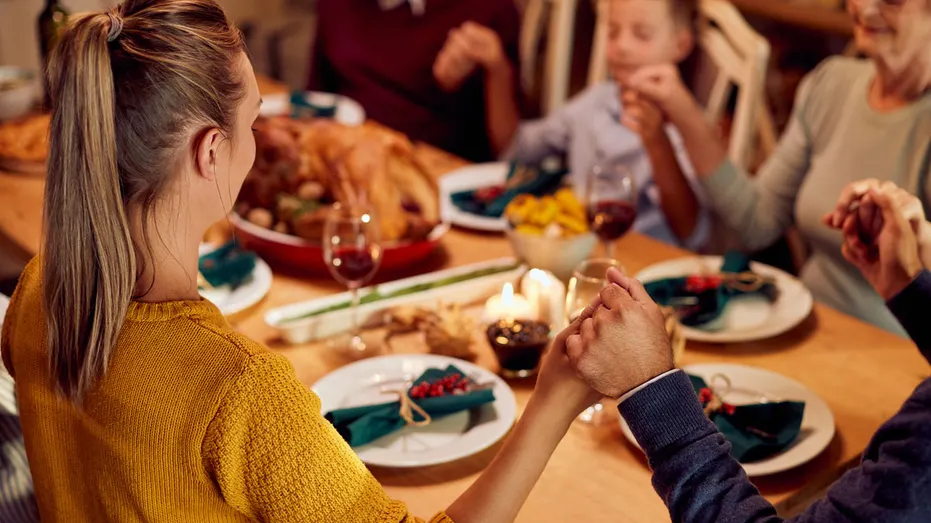The focus of Thanksgiving may seem pretty simple — cooking, eating and giving thanks — but the specific choices made throughout the day can have an impact on your overall health.
From choice of food to stress levels, there are many aspects of the holiday that can affect physical and mental well-being.
Several wellness experts offered their top tips for navigating Thanksgiving in the healthiest possible way.
BEST TIME FOR THANKSGIVING DINNER: NUTRITIONISTS GIVE RECOMMENDATIONS FOR PROPER DIGESTION
Thanksgiving is the perfect time to reflect on the good in your life, according to Amy Morin, a Florida-based psychotherapist and author of “13 Things Mentally Strong People Don’t Do.”
She suggests starting the day by listing three things you’re grateful for — “whether it’s the support of loved ones, good health, or even a small joy like your favorite coffee.”
“Taking a moment to think about what you’re truly grateful for in a quiet moment can set a positive tone for the day,” Morin told Fox News Digital.
“It can also increase your happiness, improve your relationships and give you a boost in mental strength that you’ll likely need during the day.”
It might seem wise to forgo the meal leading up to Thanksgiving, with the idea of “making room” for the main food event, but experts say that’s not a good idea.
“When you skip breakfast or lunch, you tend to be ravenous by the time you do eat, and that sets you up for overeating as you overindulge,” Shelley Balls, a registered dietitian nutritionist at Consumer Health Digest based in Wyoming, told Fox News Digital.
THANKSGIVING ON OZEMPIC: HERE’S HOW TO ENJOY THE MEAL WITH A SMALLER APPETITE
“This is often accompanied by a sluggish, painful and miserable feeling afterward, as you tend to eat faster without listening to your fullness cues.”
Instead, she recommends eating a balanced breakfast so you feel more satisfied throughout the day.
“When Thanksgiving dinner rolls around, you’ll have more control of what and how much you choose to eat.”
Among the many options on the Thanksgiving table, some choices are better than others.
“Have a little bit of everything (because that’s tradition), but tread lightly around the charcuterie board — and when you go for seconds, cut down on the butter, cream and fats,” advised Dr. Michael Schopis, a New York gastroenterologist.
It’s best to avoid pre-processed foods, foods high in nitrates (cured meats), simple carbohydrates and trans fats, the doctor told Fox News Digital.
“Some patients have trouble digesting certain carbohydrates, which can lead to excessive bloating and gas, causing pain related to functional disorders such as irritable bowel syndrome,” he cautioned.
“Nitrates in high amounts have been known to increase the risk of developing polyps and certain GI cancers,” Schopis added.
Dr. Jaclyn Albin, director of culinary medicine at UT Southwestern in Dallas, Texas, recommends starting with a smaller helping and going back for more if you’re still hungry.
“Plan to fill half the plate with fruits and veggies and create a balance between proteins, fruits, fiber and sweets,” she suggested to Fox News Digital.
“Also, don’t be afraid to add variety. Savoring the different colors, flavors and textures will enhance the meal.”
“Chew thoroughly, savor the flavors, notice the food’s appearance and aroma and engage in conversation with family and friends to slow down,” Jennifer Wilcox, a Fay dietitian based in Chicago, told Fox News Digital.
“A slower pace of eating will help improve digestion and help you recognize comfortable fullness.”
Another reason to slow down is that the faster you eat (and the less you chew), the more stomach acids have to work to break down foods, which leads to gas, bloating and reflux, Schopis added.
This tip comes from Christine Byrne, a registered dietitian and the owner of Ruby Oak Nutrition in Raleigh, North Carolina.
GIVING THANKS CAN MAKE YOU HAPPIER AND HEALTHIER, EXPERTS SAY
“Keeping alcohol to a minimum will help you feel much better while you eat and afterward,” she told Fox News Digital.
“Because alcohol is a toxin, your body (particularly your liver) prioritizes breaking it down and getting it out of your system,” she went on. “That means digesting other food gets put on hold while the alcohol is processed.”
As a result, you could feel uncomfortable for hours after the meal, Byrne said.
“If you can, stick to water while you eat, and alternate boozy beverages with non-alcoholic ones.”
The holidays can be challenging when it comes to family relationships, as differences in lifestyle, opinions and values can cause rifts that are challenging to navigate, according to Jillian Amodio, a licensed therapist and founder of Moms for Mental Health in Maryland.
“When seeing family this holiday season, set boundaries for yourself,” Amodio advised.
“Who can you be around, and who will be too difficult to spend time with? Be honest with yourself and make the decision that will benefit your mental health.”
It’s best to avoid engaging in topics of conversation that could become inflammatory, she said.
“Choose to speak about things you have in common and reminisce over good memories,” Amodio recommended.
Some other ideas include bringing old photo albums, playing board games and taking breaks throughout the day by stepping into another room as needed.
“Remember that Thanksgiving is just one day and guilt is not a food group,” said Elizabeth Harris, a registered dietitian in Maryland.
“Consider how you want to feel after your holiday meal and do your best to walk your choices backwards from there.”
And if you miss the mark, it’s not the end of the world, she noted.
“You get another chance at your very next meal to practice making feel-good choices that better support your needs.”
“Amid the cooking, hosting and socializing, carve out small moments to recharge,” suggested Morin.
CLICK HERE TO SIGN UP FOR OUR HEALTH NEWSLETTER
When things feel overwhelming throughout the busy day, the psychotherapist suggests taking five minutes to breathe deeply, meditate or just enjoy a quiet moment with your thoughts.
“These little pockets of relaxation can give you the mental strength you need to make it through the day,” she told Fox News Digital.
Experts agree that it’s important to take a walk after the Thanksgiving meal, even if it’s short.
“Exercise and physical activity increases the body’s metabolic rate, helping your body process richer foods more effectively,” noted Melissa Burdi, dean and vice president of the Purdue Global School of Nursing and a cardiac nurse in Illinois.
For more Health articles, visit www.foxnews.com/health
“It also stimulates the digestive tract, preventing bloating or discomfort from heavy meals.”
Post-meal movement also helps to regulate blood sugar levels, especially after consuming calorie-dense foods, Burdi added.




